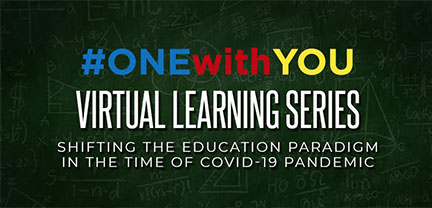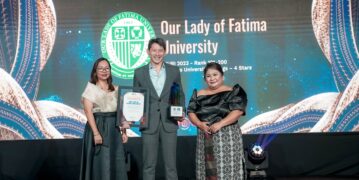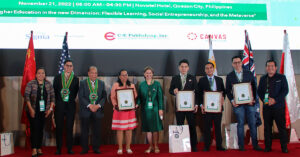Since the COVID-19 pandemic hit, major adjustments have been made in society and in the lives of people around the world. The education sector, of course, is no exception for The New Normal. In the Philippines where face-to-face interaction is the predominant mode of delivery, schools, in all levels, had to take a 180-degree turn— quality education, for the most part, must make strides on a whole new ground.
It is undeniable that students are greatly affected by the sudden shift as learning through online modalities appear to be a sizeable challenge, but it must be noted that this also applies to educators, who are likewise part of the equation. To ensure effective teaching and instruction through new and advanced media, it is important for administrators and teachers to have a firm grasp of the situation. The academic community braves this big wave together, and educators must learn with and from each other.
With eagerness for collaboration, Our Lady of Fatima University (OLFU) educators took part in webinars of the #OneWithYou Virtual Learning Series hosted by PLDT Enterprise, the Philippine Association of Colleges and Universities (PACU), and the Private Education Assistance Committee (PEAC) this June 2020. With the theme “Shifting the Education Paradigm in the Time of COVID-19 Pandemic”, the series laid a platform for Philippine educational institutions to share best practices, empowering one another as they rise up to the challenges.
On the 17 June 2020 webinar, University President, Dr. Caroline Marian S. Enriquez, who is also the current President of PACU, gave encouraging words of welcome to all attendees from different schools in the country. She expressed solidarity with them as educational leaders who strive to maintain and deliver high quality education amid the pandemic. Moreover, she acknowledged that possible solutions to various concerns within the community have yet to be proven, but they “must be pursued as the best alternatives given the situation.”
Dr. Enriquez also highlighted the importance of preparation in these unpredictable times. “Things might change but what we know is that in spite of the uncertain times, we must prepare better so that regardless of the fluidity of the situation, we can transition easily,” she averred.
The next speaker, Engr. Bernard Villamor, President of the Cebu Institute of Technology- University (CIT- U), talked about their early stages of adopting distance learning, which he described as an “uncomfortable and new frontier” during that time. With the quarantine preventing the conventional setup of classes, they moved to create an “emergency remote teaching platform” by leveraging on what was available to them. He shared that they took on a “Lego-like mindset” in building the said plan. “The bits and pieces were already there and we just had to orchestrate a new way of delivering education with new roles highlighted, new tasks created with no manual, and just in time to address the pain points and wishes of those faint voices of our students,” he said.
Such efforts paved the way for CIT- U’s MADE4Learners Framework, which stood for Multiple Approaches to Distance Education. The framework was further discussed by its Chief Architect and the Dean of CIT- U’s College of Computer Studies, Dr. Cherry Lyn Sta. Romana.
Professor Vicente Antonio Pijano III, Vice President for Academics, Administration and Institutional Development of the Philippine Women’s College (PWC) of Davao, also introduced their take on educating in the time of COVID-19: the PWC Digital Learning Commons and the PWC OxyGEN.
“The main rationale for our Digital Learning Commons is that in times of crisis, we needed to adapt, to innovate, and to embrace change to survive,” he said. The development of these platforms were guided by two principles: Re-Imagine and Re-Cast Education which he heavily emphasized on. According to him, merely converting a face-to-face modality online “without re-imagining and re-casting” will not thrive. “E-learning is just a tool; it doesn’t replace a good teacher. A teacher can be guided to be able to re-imagine and re-cast what they have been teaching, what they have been doing for ten, twenty years, in a new modality,” he said.
Throughout his talk, Prof. Pijano also highlighted that this development process is a “change process.” “It entails a change of attitude, a change of mindset and a change of how we used to do things,” he closed.
The last speaker was Benedict Perez, Customer Relationship Management Head of PLDT Enterprise. Recognizing the impact of the pandemic, he discussed the global and Philippine education landscapes. He gave suggestions for educational institutions, such as the LIST Method, which stands for Listen, Initiative, Success, and continuous Transformation and likewise presented a solution framework for online learning, as well as other educational solutions powered by PLDT.
The said webinar ended with a question and answer session with all the panelists which further fostered collaboration.
—
On 24 June 2020, the second webinar of the series was attended once again by OLFU educators. This time, the discussions were more focused towards the challenges of online education and carrying out learning continuity plans.
In his opening remarks, Anthony L. Tamayo, President of the University of Perpetual Help System – DALTA and First Vice President of PACU, heartened everyone: “Let us not allow the pandemic to hinder our mission of providing the best education to the next generation which they truly deserve.”
Dr. Vicente Fabella, President of Jose Rizal University (JRU), gave an insightful discussion of the challenges faced by educational institutions amid the pandemic along with helpful suggestions. Moreover, he talked about flexibility in operations and in learning, advising everyone that “in times of uncertainty, be very flexible.” On innovation, he presented how digital transformation continuously takes place at JRU, describing this kind of experience as “learning to build the plane while flying it.”
Dr. Leo De Velez, Founder of Frontlearners, Inc. led a talk on “Managing the Learning Continuity Plan” and other technical recommendations, including Key Selection Criteria for an E-Learning Solution.
Lastly, Paolo Balinas, Education Channel Manager of Microsoft, introduced online learning solutions and tools, such as Microsoft Education and Microsoft Teams. On remote learning, he said that it is “not just putting content online.” Rather, it is “recreating classroom learning in a virtual environment.”
—
Learning is indeed at full speed even in this time of the COVID-19 pandemic— students, teachers, and parents are learning how to maneuver life in The New Normal. While the future is still unclear, resilience, perseverance, and cooperation shall enable OLFU and the whole academic community to rise from obstacles and achieve impactful goals for society.



